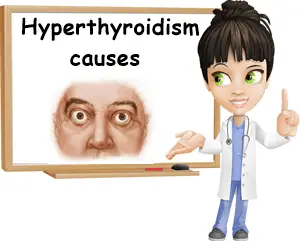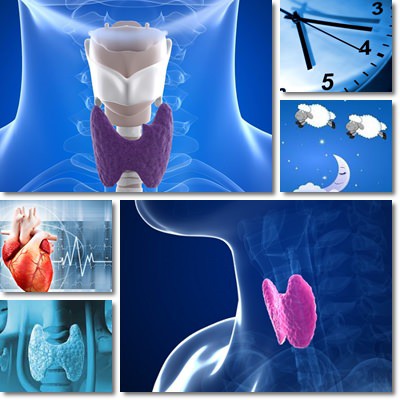Hyperthyroidism is a medical condition characterized by the thyroid gland producing too much hormone. By exceeding the body’s needs of thyroid hormones, the condition causes serious imbalances that can take the form of increased metabolism, increased appetite, weight loss, tremors, muscle weakness or aches, impaired fertility, palpitations, heat sensitivity, unexplained tiredness, irritability, emotional instability, bulging eyes and others.
Hyperthyroidism basically means the thyroid is producing and releasing too much hormones into the blood. The medical condition that develops as a result of this hormonal excess is known as thyrotoxicosis. The term is used to describe the physical and psychological effects of an overactive thyroid. Causes for the condition may range from physical abnormalities of the thyroid to inflammation, auto-immune disorders or disease (Grave’s disease).

Hyperthyroidism is the opposite of hypothyroidism. Normally, the thyroid (an endocrine organ or gland located at the front of the throat) produces two hormones (triiodothyronine and thyroxine) and releases them directly into the bloodstream to regulate metabolism. These two hormones are designed to impact basic metabolic processes such as breathing, brain function, body temperature, muscle contraction etc. Anything except just the right amount of thyroid hormones means these processes are either slowed down or accelerated, resulting primarily in symptoms of altered metabolism.
What causes hyperthyroidism?
The most and least common causes for an overactive thyroid are:
1) Auto-immune disorders. Grave’s disease is an auto-immune disease and one of the most common causes for hyperthyroidism worldwide. An auto-immune disease causes the immune system to be overzealous and attack healthy parts of the body, in this case the thyroid. The immune system produces an antibody called thyroid stimulating immunoglobulin, which is especially designed to attack thyroid tissue, but also stimulates the production of thyroid hormone. This causes an excess of hormone in the blood and the resulting symptoms characteristic of an overactive thyroid.
Auto-immune disorders generally have a genetic component. If someone in your family has Grave’s disease, you are at higher risk of developing the disease and hyperthyroidism as well compared to people with no family history of the disease. Also, having another auto-immune disorders is believed to put you at risk for others as well.

2) Tumors or nodules. A benign tumor of the thyroid called an adenoma can increase the production of thyroid hormone and lead to an overactive organ. Various nodules can develop on the thyroid and secrete thyroid hormone themselves, causing excess hormones to be released into the bloodstream and overactivity. The condition is known as toxic multinodular goiter because the nodules growing create a goiter. Nodules and benign tumors have a small chance of becoming cancerous, which is why they are constantly monitored for changes. Tumors of the reproductive organs or of the pituitary gland (which tells the thyroid how much hormone to produce) may also lead to an overactive organ.
3) Thyroiditis. This refers to the inflammation of the thyroid gland. The inflammation can occur as a result of infection, injury or disease. For example, Hashimoto’s thyroiditis is an auto-immune disorder that causes the immune system to attack and destroy the thyroid, resulting in inflammation and dysfunction. Post-partum thyroiditis can appear up to a year after delivering a baby and causes an inflamed and overactive thyroid, but often ends in hypothyroidism.
4) Pregnancy. During pregnancy, the immune function is slightly suppressed to prevent the fetus from being rejected. After delivery, it slowly bounces back and this may cause a temporary hyperthyroidism which tends to resolve itself over the course of several months. However, it is common for it to turn into hypothyroidism which can be either temporary or permanent.
5) Medication. Certain medication can cause hyperthyroidism if recommended doses are too high. Examples include certain medicines for arrhythmia and, of course, synthetic thyroid hormones prescribed as a hormone replacement therapy for underactive thyroid.
6) Excess iodine. It is possible for some people to have a too high a intake of iodine which stimulates the production of excess hormone. Iodine is naturally found in generous amounts of seafood, but also in iodized table salt. Discontinuing or reducing consumption allows the thyroid to resume normal function.
Signs and symptoms
How does hyperthyroidism affect the body? The following signs and symptoms show how the condition impacts multiple aspects of human health:
1) Fast metabolism.
2) Increased appetite and increased thirst.
3) Inexplicable weight loss (rarely weight gain).
4) More frequent bowel movements than usual.
5) Heat sensitivity and sweating.
6) Fatigue.
7) Muscle weakness and aches.
8) Tremors, especially hand tremors (sign of nervous system hyperactivity).
9) Palpitations, fast heart rate, feeling breathless.
10) Irritability, nervousness.
11) Disturbed sleep, insomnia.
12) Skin itching and thinning.
13) Brittle hair.
14) Nausea and vomiting.
15) Protruding or bulging eyes (in Grave’s disease).
16) Memory and focus problems.
17) Emotional instability.
18) Likeliness of experiencing anxiety, panic attacks, depression.
19) Amenorrhea and fertility problems.
The more thyroid hormone production increases, the more accentuated symptoms will be. How does hyperthyroidism affect female fertility? Thyroid hormones directly impact female fertility by interfering with the normal production of female hormones that ensure the occurrence of pregnancy.
How does hyperthyroidism affect the heart and cardiovascular system? If the condition is left untreated, treatment is discontinued for any reason or loses effectiveness or complications arise, hyperthyroidism may result in what is known as thyroid storm, an acute phase characterized by the onset of severe, potentially life-threatening symptoms which requires immediate medical attention and treatment. It is recommended to see a doctor immediately if you experience: dizziness, irregular and fast heartbeat, shortness of breath, fever, vomiting, sudden, inexplicable and severe agitation or anxiety. Not receiving medical assistance in such situations can result in heart failure or stroke.
Treatment and solutions
Treatment options depend on what has caused the condition in the first place and should only be pursued at the advice of and under the careful supervision of a medical professional. Generally, the following are recommended:
1) Reducing iodine intake. If the disorder is caused by too much iodine, reducing intake should allow the thyroid to get back to normal in a relatively short amount of time. Seafood and iodized salt are two of the best dietary sources of iodine and their consumption is best discontinued for a while or reduced. But, most important, talk to your doctor first.
2) Medication. Anti-thyroid medicines have been developed to inhibit the production of specific hormones. The only downside is that the correct doses are hard to establish so there is always the risk of the organ becoming underactive as a result. Beta-blockers are prescribed for managing symptoms such as shortness of breath, palpitations, arrhythmia.
3) Radiation to destroy part of the thyroid. Although the aim is to partially impair thyroid function in order to have a lower production of hormones, the treatment may affect a bigger portion of the organ than intended and result in hypothyroidism. Sometimes, this is preferred as underactivity is much better managed than overactivity.
4) Surgery. Doctors may recommend removing toxic or suspicious nodules or part of the thyroid in an attempt to reduce production of hormones and risks of outcomes such as thyroid cancer. While effective, this treatment option may put the patient at risk for hypothyroidism sometime in the future.
